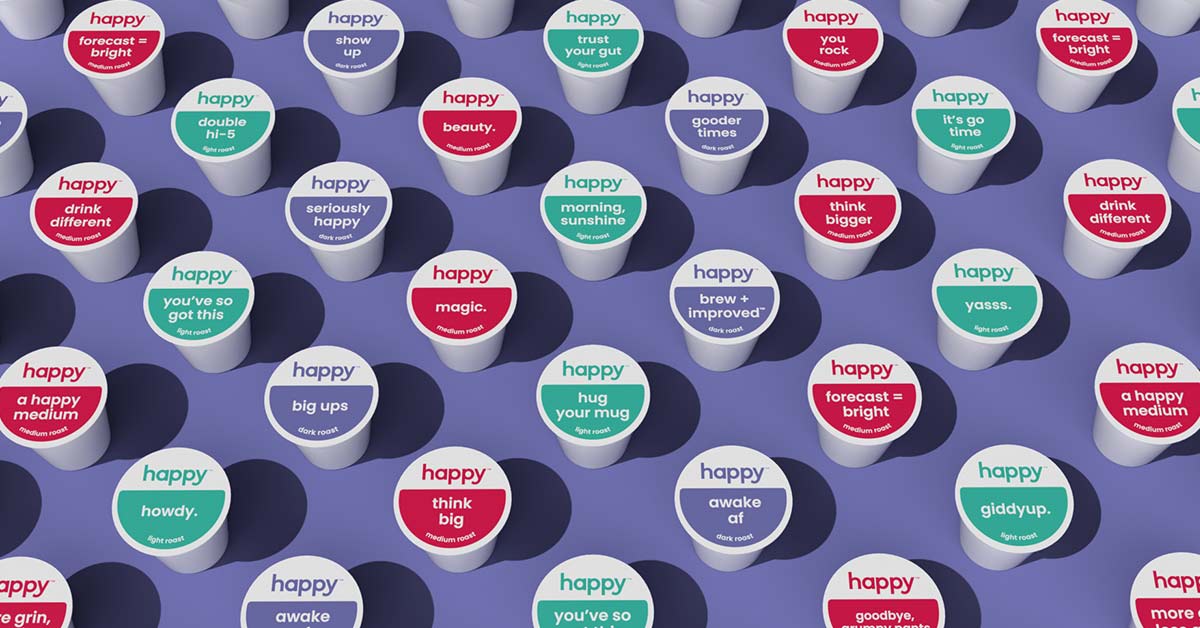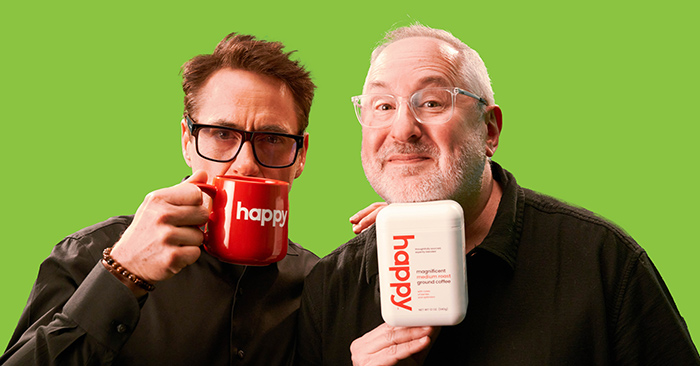Get ‘Happy’: Meet Marvel Star Robert Downey, Jr.’s New Coffee Brand

In his first foray into food and beverage, CPG industry veteran Craig Dubitsky is seeking to pair a philanthropic mission and unique business structure with the clout of a recognizable face to compete in the $17 billion coffee category.
Dubitsky, the founder of spherical lip balm brand eos and vegan oral care company hello products, launched coffee brand happy products this week, in partnership with Iron Man star Robert Downey, Jr. The co-founders named the brand happy (and trademarked “happy” in the process) because even though “not everybody is happy,” Dubitsky said, they wanted to create something that brought a moment of joy to people’s daily routines in a way that was “not performative.”
The brand is backing that claim by aligning with the largest mental health organization in the country, National Alliance on Mental Illness (NAMI), and giving the nonprofit an ownership stake in happy products. Happy declined to comment on the terms of the NAMI’s stakeholder status nor if the nonprofit would have any input on the direction of the company but on NAMI’s website the partnership is described as an “equity stake.” As part of the deal, every happy product will include details about NAMI’s mission and details directing consumers to the organization’s suicide prevention hotline.
“We want to change the relationship between entrepreneurship and philanthropy and see if we can push that forward into a new place,” Dubitsky said.
Along with its website and ecommerce launch today, Happy products made its retail debut in Target stores with a full line of coffee options including three roasts — Astonishing Dark, Miraculous Medium and Extraordinary Light — in ground, whole bean and K-cup pods with the bagged varieties retailing for about $12.99 per 12 oz. bag. Happy is also releasing two SKUs of instant stick packs (medium and dark roasts) that can be mixed with hot or cold water in 8-count boxes.
Happy products is not the only coffee brand to use “happiness” as the brand’s selling point. Wellness brand The Happy Co. makes a functional coffee product called Max Happy Coffee. There is also a RTD hard nitro coffee brand called Happy Coffee produced by Two Robbers Spirits company and various specialty roasters making “happy” blends.
Along with its mental health awareness mission, happy is also trying to create a scalable coffee business with a fully transparent and traceable supply chain. Each product has a code printed on the bottom of the fully recyclable packaging that traces each happy products’ beans from region to harvest and roast date using blockchain technology. The brand’s K-cup pods are Rainforest Alliance-certified as well.
The brand is using “the largest vertically integrated coffee roaster in the world” (the brand declined to release the roaster’s name) to source its beans while employing one of the top coffee Q graders to develop its proprietary blends in order to make the brand accessible and “egalitarian,” Dubitsky said.
Dubitsky took a similar approach with his other CPG brands, which were built for speed and scale while still bringing a nuanced take on a household staple. Eos brought a new design to the lip balm category that has been replicated by many competitors and Dubitsky’s subscription-based oral care brand hello products differentiated from its competitors with its online platform and product variety. Hello was acquired by Colgate-Palmolive in 2020, but Dubitsky continued in a leadership position until the end of last year.
Along with its Target and website launch today, happy is also planning to add both retailers and additional products over the course of the year.
“It’s a platform brand because it has other things to stand for and stand on,” Dubitsky said. “In addition to a delicious, thoughtfully sourced set of products, we were very mindful about how we set these pillars in place and where we put them so we can build something that’s going to hopefully be around for a long time.”

Much like spirits, coffee has proven an attractive space for celebrity- and influencer-backed ventures, ranging to director Taika Waititi’s partnership with Taika, to social media star Emma Chamberlain’s eponymous brand to the brew battle boiling over between Yellowstone’s Taylor Sheridan and Cole Hauser.
Yet, Dubitsky was clear that the partnership with Downey, himself an active investor and entrepreneur, was brought together through a mutual acquaintance and is not a case of “a light participant” in the brand, he said.
Downey is “in deep,” he added, with the Oscar-nominated actor participating in everything from retail visits and broker team conversations to creative discussions and copy review. He will also be featured in brand marketing in the future.
“We want to make things people fall in love with, not that they buy,” Dubitsky said.

















